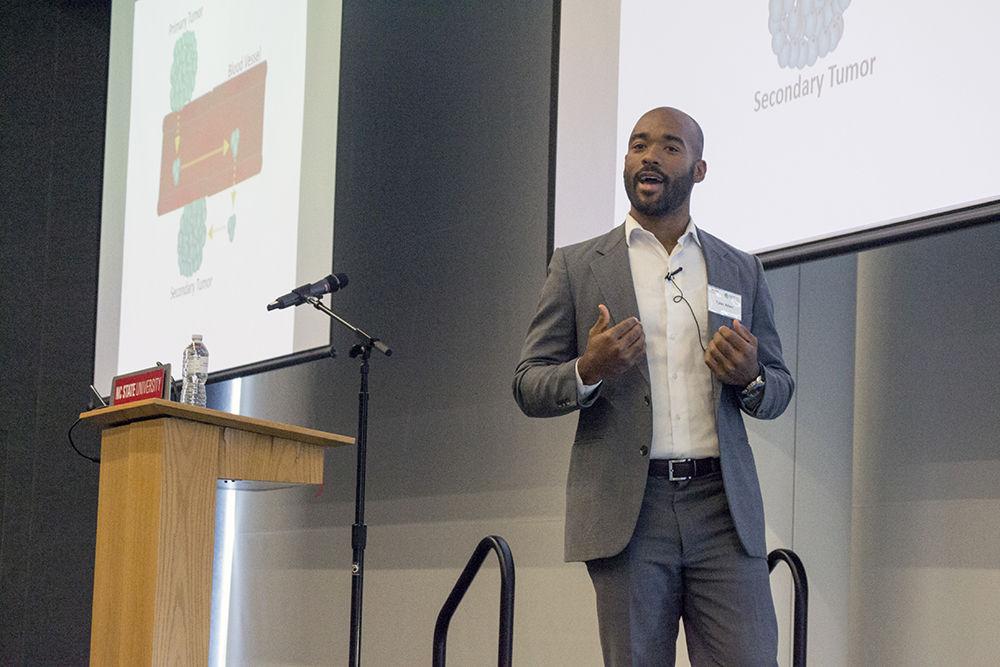Tyler Allen, a graduate student studying comparative biomedical sciences, has landed a spot on Forbes’ 30 Under 30 Science list for his research in cancer and tumor cells. Allen studied molecular/cellular biology and plant biology during his undergraduate years at NC State. Technician sat down with Allen to learn more about his work and what it means to him to be recognized by the business magazine.
Recently you have been named on Forbes’ 30 Under 30 list for your research. Could you tell us a little bit about the research that you’re working on?
My most current research, which is what I was highlighted in Forbes for, was research that I do looking at cancer and tumor cells in the body. When a person gets cancer, they have a tumor forming in their body, and when this disease becomes very dangerous or deadly is when that tumor spreads to different parts of the body. With cancer, this occurs through a process known as metastasis, which is when the tumor or cells from the cancer travel from one part of the body through the bloodstream and then exit and grow and form more tumors. I study specifically the process of how the tumor or the cancer cells, when they’re in the circulation, how they travel through and how they exit the blood vessels and then form these new tumors which are called secondary tumors.
What specifically got you interested in cancer research, especially considering your background in biology and plant biology?
I don’t have a specific anecdotal story where someone in my family had cancer. It was for me, growing up, I saw cancer as this big entity because so many people have cancer and there are so many people who are affected by cancer. It is still such a problem or issue, even with all of the advances and information that we have in biomedicine and biology. There is still a prevalence with it being one of the leading causes of death worldwide. I got interested in the biology behind cancer, and that way, I learned about it more. Then after I sought out research labs that were doing work with cancer as an undergrad, and that’s when I started working with Johnathan Horowitz, who is a professor here in cancer biology. I started doing research with him, and then after that it was kind of just I found it interesting to learn more about the process, and it kind of stuck with me, so that’s what I’m doing now and what I am really interested in.
What does it mean to you to be recognized by Forbes, and what do you think you will get out of it on both personal and academic levels?
This is something I have been working really hard towards. This is research that I have been working on for the past few years actually, so this is a large portion of my dissertation research is this discovery that was being recognized. It is always nice being recognized for your work, especially when you’re so passionate about it and spend so much time working on it. However, for the latter part of the question, you get recognition through their magazine by being on the list, but you don’t get anything. They just put you on the list. But, I mean, it is a great way for recognition, getting more people knowing about what you’re doing and gaining more interest in the work that you’re doing which is definitely good because, since I have been named on the list, I have had multiple opportunities where I have been either invited to talk more about my research or people have contacted me about potentially working with me on my projects or in the future. I think that’s a good benefit of this recognition, and hopefully I can utilize this momentum to further the research along and find more discoveries out to treat and prevent cancer.
Where do you see yourself going with this research? What are you hoping to do in the future with everything you are working on?
I hope to at least continue looking at the process that I am currently looking at and the discovery that was made, and hopefully, expounding upon this research for increased knowledge of what is happening when cancer spreads with the long-term hope of finding a way to prevent or mitigate cancer spread or metastasis.
Any additional thoughts on the research or the recognition for your future plans that you want to share?
I definitely owe a lot of my success to the university and how much it supports its students. As I mentioned before, I have been at State since undergrad so this is my eighth year at the university, so I have been here my entire adult life. I think it speaks a testament to the amount of resources and growth that NC State gives its students and allows them the ability to grow. The support team that I have had here in terms of professors, faculty, staff and even students has been amazing.








